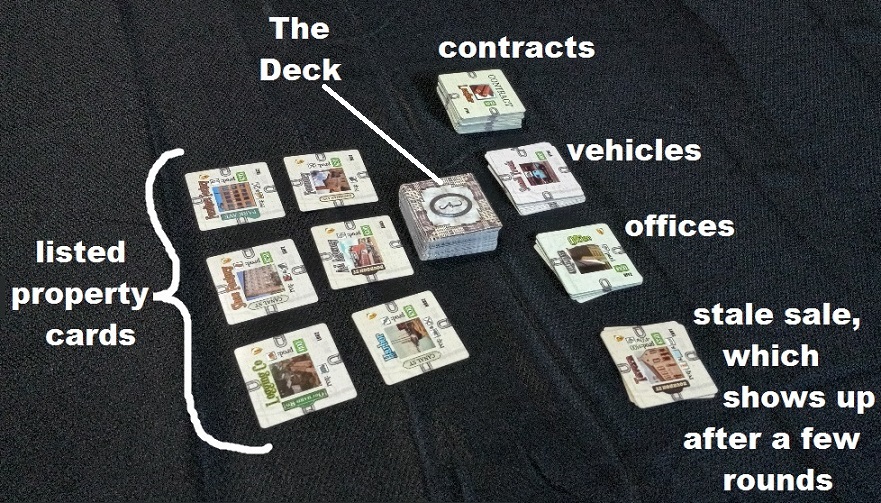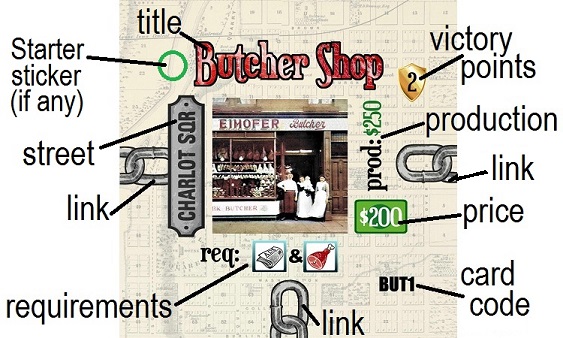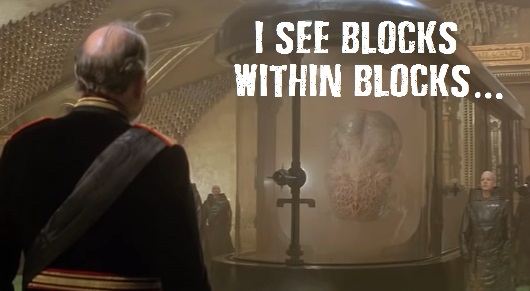---------- Set up ----------
Note: Play on a table with felt or a table cloth.The cards are too slick to play on a hard surface.
1. Choose Player 1.
2. The game comes with 210 cards. Pull out the following sets of cards:
Main Offices (6) light green plat background,
other offices (9) light green plat background,
Vehicles (trucks and boats) (16) grey plat background,
Contracts (58) light green worded background,
Special Offices (27) light blue plat background,
Starter businesses (8) round green "start" button in upper left,
Derelict properties (6) pink plat background,
and Business Plans (6) file cabinet image on both sides.
What is left is the "Full Deck" (74 cards). The Full Deck is for 3-6 players. If you have 1-3 players, you can play with the "Short Deck." Note: 3-player games can play with either a Full or Short Deck. To create the Short Deck pull out, and set out of play, all the property cards whose card code (in lower right) end in 2, 3, 4. This will leave you with the Short Deck, a smaller deck with only one of each property.

3. Place Contracts deck and Vehicles deck off to the side, for they are their own separate decks to buy from.
4. Shuffle and deal each player a Main Office card, which lays face up in front of them. Any extra Main Offices are added to the other offices and sit next to the Contracts and Vehicles to be purchased.
5. Shuffle and deal each player a Business Plan card. Each player reads the Business Plan card then places it face down in front themselves. The rest of the Business Plan cards go out of play.
6. Shuffle and deal each player two (2) Special Office cards, which are not immediately revealed and are the first two cards of their hand. The rest of the Special Office cards go out of play.
7. Shuffle and deal each player a Starter business, which is not revealed and is the second card of their hand. The rest of the Starter businesses go back into the deck.
8. There are six (6) derelict properties, but you only need one for each player. So add as many to the Deck as there are players. Put any excess derelicts out of play.
9. Shuffle the Deck and place it (face down) in front of Player 1.
10. All money goes into the bank. Give each player $1,500 from the bank.
11. Everyone gets a link/3VP token. Place it 3VP side up on your Main Office.
Click to jump down to the end of these rules to see the Set Up for 1-player games and Co-op games.
---------- A turn, a round, hand limit ----------
Each player gets a turn, starting with Player 1 and progressing clockwise. When every player has had a turn, and makes it back around to Player 1, then that is called a round.Each player has cards in their hand, and "Placed" cards (laid down). Hand limit is 7 cards, and this must be met at the end of a player's turn.
---------- Listing Agent and Stale Sale properties ----------
Player 1 has an extra duty, he/she acts as the Listing Agent. Before the game begins, the Listing Agent takes the top 6 cards from the Deck and lays them face up near the deck. The bottom of each card starts out pointing towards the Deck. These "Listed" cards are for sale, however, each card is only listed for four rounds. After that, they go into the Stale Sale pile. Whenever a Listed Card leaves (purchased or sent to the Stale Sale pile) the Listing Agent replaces it with the top card from the deck.
Here is how you keep track of Listed Cards going stale. The bottom of each card starts out pointing towards the Deck. Before the Agent's turn (except the Agent's first turn) the Listing Agent will tap each card (give the card a clockwise quarter turn). After a few turns, some cards will be making their fourth and final tap/turn so that their bottom is again pointing to the Deck. When this happens the card(s) are moved to a separate deck called the Stale Sale deck. The cards in the Stale Sale pile are half price. Prices in the game are always rounded up to the nearest $50 increment.
---------- Property card components ----------

Property cards:
A property card is either an office, a producer or supplier (produces a product), or a business (earns money). A property that does both (earns and produces) is considered a business. Starter businesses have a green Starter sticker in the upper left before the title.
---------- Card placement ----------
All of a player's Placed cards must link together. Cards are linked together by the chain-link symbol on their edge. Both cards must have the symbol for there to be a link. And link must be relevant (ie. have a Producer-Requirement relationship). Any incidental links (cards from unrelated blocks touching one another) are ignored. If a card has less than 4 links, and you really want that link, then you can use the link/3VP token, but then you lose the 3VP. So choose wisely.
Click link to see numerous placement examples
Block. A Block is a set of cards comprising a property card with its required producers (ie. lay down Furniture Factory with cards that produce Lumber and Tools). The cards of a Block must be Linked together. A property does not have to immediately link to each and every supplier as long as it is through another required supplier. And there may be blocks within blocks.

Any property that does not supply the block must come off an office. In other words, you cannot add properties to a block that do nothing for the block. Example: You have a block that has a Foundry creating Steel for a Metal Supply Co which in turn is supplying Tools to a business. You cannot add a Sheet Metal Co (which req Steel and prod Cans) to the Foundry because nothing in your block needs Cans. So you will have to purchase an Office and have the Sheet Metal Co start off that.
---------- Actions ----------
Each player is allowed up to two (2) Actions per turn, but they cannot be the same action. Below are the eight (8) possible Actions:Purchase: A player can purchase one card from any of these five areas: (1) the 6 listed cards, (2) Contract cards, (3) Vehicle cards, (4) Offices, or (5) the Stale Sale pile (half price). Money from purchases go to the bank. Purchases from different areas (example, a listed property and a contract) are not the same Purchase action and therefor not barred by the previous rule. But they are two actions and take up an entire turn.
Buy-Sell-Trade: Sell, buy, or trade cards with one other player. It can only be (a) one card for money, (b) one for one, (c) one for two, or (d) one for one plus money. There must be compensation. Card(s) may never be given to another player.
Swap: Exchange a card in their hand for any Listed card as long as the Listed card has a lesser price than their hand card. May not swap a hand card that was purchased from the Stale Sale pile.
Place ("set up shop"): Lay down one card (office or property with no Requirements) or lay down a "Block" of cards. If the Block intersects and replaces a Contract card, then that Contract card goes back to the Contract deck. An office can be placed alone or when laying other cards. A player will use the Place action to replace a Contract with a producing property.
Revenue: Collect any money produced on a Revenue Route. A Revenue Route starts at an office (collecting any money produced by that office) and moves along linked cards until a dead-end or reaches another office. A Route may not move across a card more than once nor backup over previous cards. Businesses produce +$50 for every Required producer that shares the same street.
See Revenue collection route
Reorganize: Without adding cards, reorganize your placed cards. Make sure your Reorganization does not ruin the supply chains of any blocks. Any removed (unnecessary) property cards are sent to the Stale Sale pile, and any removed Contract or Vehicle cards go back in their respective sale decks. Spinning a card does not count as reorganization and can be done at any time.
Close: Take a placed card, or Block of placed cards, back into your hand keeping mind of your hand limit, and Anti-Trust Laws. You cannot remove a card that would ruin a Block. The Close action is the only time a placed card goes back into your hand.
Blind Purchase: Take the top card of the deck and pay its purchase price -$50 off. If the player cannot afford the card, then it sets off to the side and that player must perform the Revenue action on all successive turns until the player can afford to purchase the card.
Extras:
Discard. Free extra action. At any time a player may abandon card(s), expelling them from their hand or placement. A placed card can be abandoned as long as the expulsion does not ruin a placed block. Abandoned property cards go to the Stale Sale pile, and Contact and Vehicle cards go back to their respective for-sale decks.
Dual actions. A player may take the Place and Reorganize action at the same time. This is due to the complexity of placing new cards and the need to reorganize them into existing blocks. But this is two actions and takes the player's entire turn. So if you Purchase a card with your first action, and want to place it, but you need to Reorganize also, then you'll have to wait for your next turn so you can dual action Place and Reorganize.
---------- Anti-trust and Anti-monopoly Laws ----------
A. A player may not have more than $2,000 on hand. If a Revenue action gives a player more than $2,000 then the excess is given back to the bank.B. A player may not own (placed or in hand) two more Offices than any other player(s).
C. A player may not have more than one Contract or Vehicle of the same kind in his/her hand.
D. A placed Contract or Vehicle must be part of a block, and not placed alone.
E. Transparency. During their turn, players must reveal the number of Offices, Contracts, or Vehicles in their hand if asked.
F. A player may only possess and place one (1) derelict property the entire game.
---------- Special and misc cards ----------
Starter card. "The family business" Starter cards have a green Starter symbol in the upper left corner. Each player begins the game with a Starter card. A player may never sell or abandon their Starter card. They must place it, or it stays in their hand. This rule does not apply to any left-over Starter cards a player might purchase later in the game.Offices. Each player starts with one Main Office (green) and it is Placed down at the beginning of the game. Your starting Main Office cannot be Sold nor Swapped nor Discarded. Special Offices (blue) can be placed later during a Placement action. If you are unhappy with any of your Special Offices then you may Swap them for a Listed Property. Other offices (green) that are purchased may be Placed, Sold, Swapped, or Discarded.
Contracts. Early in the game, getting all the properties to produce a certain product might be difficult. Feel free to purchase and use a Contract card in it's place until you get those properties. When you do replace a Contract card with a property, that Contract goes back in the Contract deck, not in your hand.
Trucks. Many property cards require a vehicle. Please look closely so you don't confuse a small truck with a large truck.
Business plans. Not revealed until the end of the game, business plans increase victory points based on the streets of your properties.
Derelict property. "A thorn in my side" A player may use a Place action to attach (via links) a Derelict property card (pink) to any property of another player. Derelicts cannot be attached to a contract nor vehicle card. The derelict card is attached to that property for the rest of the game and cannot be removed for any reason, nor can that property be sold, closed, nor abandoned. If the player moves that attached property during reorganization, then the derelict attachment must go with it.

---------- End Game and Winner ----------
The game ends, at the end of the Round, when there are no more Listed Cards for sale. The player with the most Victory Points (VP) of cards placed down is the winner. Players reveal their Business Plan card which may increase their VP. Add 1 VP for any and all properties on the two streets listed on your Business Plan. In case of a VP tie, the player that collects the most money on a Revenue Route is the winner.---------- Suggestions to help speed up the game ----------
1. If Player 1 (Listing Agent) is busy, another player can tap the Listed Property cards when it is time, or replace a sold Listed Property card from the top of the deck.2. Once you have a Revenue Route that collects over $2,000 then there is no reason to add it up everytime, or take its exact amount from the Bank since you are limited to $2,000. Just take enough money so you are at your $2,000 limit.
3. If a player's actions do not affect the next player: placing, collecting revenue, or purchasing a non-Listed-Property, then the next player can go.
4. If you are going to sell or trade a card to another player, have the haggling and negotiations done before your turn.
------ Set up for 1-player and Co-op games and Easy difficulty -----
1-player solo gameIt is like the playing-card game solitaire. Objective: Can you use all your cards, or will you have some left over? And how many Victory Points will you end up with?
Using the Short Deck (with no Starter Businesses and only 1 Ad Agency), deal yourself 15 random property cards. Then deal yourself 1 random Starter Business, 1 Business Plan, and give yourself a 1 link/3VP token. Now try to legally place as many of your 15 property cards as you can. You may also take any vehicle and contract cards as you need as long as they are not duplicates, so only one of each. There is no Deck, no Listed Property cards, no money, no hand limit, and no turns nor rounds. Just try your best to place your 15 cards. You must place your Starter Business.
In end, count up your Victory Points. Along with VP score, note the number of contracts used (tie breaker, the less the better). And there are enough cards in the Short Deck for 2 people to each play a solitaire game at the same time.
Co-op game game
Set up is like a normal game except the following. Partners only get 1 Main Office and they must share it. They also only get 1 Business Plan to share. And only 1 link/3VP token to share. But partners each get their own starting $1,500 and have their own card hand, and are in control over their own turn and actions.
The game has turns and rounds like a normal game, but partners cannot take successive turns. So an example of turn order in a round would be: first partner of team 1, first partner of team 2, second partner of team 1, and finally second partner of team 2.
One thing to keep in mind is the rule regarding the action Buy, Sell, Trade. No player may give another player a free card. There must be money exchanged, or a trade of cards. And for co-op games a card cannot be sold to another player (including partners) for less than its listed price.
 Supply Chain the card game
Supply Chain the card game